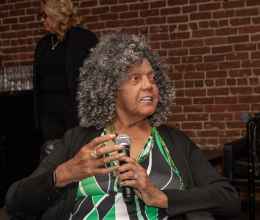Shon Thomas and Gwendolyn Cheney are two Black transgender women enrolled in Georgia Medicaid who have been unable to access gender-affirming surgical care. They have sued the state, alleging that denying access to gender-affirming surgeries under Medicaid is a violation of the U.S. Constitution, the Affordable Care Act, and the Medicaid Act. They are represented by the ACLU and the ACLU of Georgia.
Georgia is one of 10 states that bans transgender adults from receiving gender-affirming care under Medicaid. Approximately 5,000 transgender Georgians are on Medicaid. Black and transgender people use Medicaid at rates higher than the general population.
While Shon and Gwendolyn have both known they are women since before they are adults, they have each been unable to consistently access gender-affirming care. Both experienced physical and verbal abuse while growing up. They each have had access to hormones in recent years but are unable to obtain the surgical procedures they desire — which are supported by doctors — due to Georgia’s ban on these procedures.
ACLU lawsuits have successfully stuck down bans on gender-affirming care in Medicaid and other government-run health insurance programs in several states. Federal courts have consistently agreed with an overwhelming majority of doctors and medical experts in saying that gender-affirming care is medically necessary care and that denying this care is discrimination and against the law.
Biographies
SHON THOMAS
Shon is a Black transgender woman from Riverdale, GA, who is 44 years old. She has been permanently disabled since 2010 and receives health insurance coverage through Georgia Medicaid which has denied her medically necessary care because she is transgender.
At age 17, Shon began to socially transition. She was physically and verbally abused at home and left at age 18. Because she lacked health insurance for much of her life, Shon used off-market hormones and silicone injections to affirm her gender. Her lack of insurance combined with a fear of discrimination and a lack of competent health care provides meant that she avoided other forms of licensed health care during this time.
Since approved for Medicaid in 2014, Shon has been able to access non-surgical gender affirming care as well as other health care. In 2019, Shon and her health care provider determined that gender-affirming surgical procedures were medically necessary. Shon made arrangements for a procedure and 6 days before the surgery it was cancelled because Georgia Medicaid decided to ignore the recommendations of medical professionals and say the surgery was not medically necessary.
Shon has sued the state of Georgia so she and other transgender Georgians on Medicaid can access a full range of gender-affirming care.
GWENDOLYN CHENEY
Gwendolyn, a 59-year-old Black transgender woman from Athens, GA, has know she is a woman from at least age 11. She has not had health insurance for much of her life and has often been unable to find a medical provider who has experience with gender-affirming care. Even if she had a competent provider, Georgia Medicaid would deny the care she seeks.
After telling her family that she is transgender, Gwendolyn encountered physical and verbal abuse. Her mother brought her to a psychiatrist who affirmed Gwendolyn and told her mother that Gwendolyn is a woman and that wouldn’t change.
Unfortunately, Gwendolyn’s family still refused to accept her.
Starting at age 18, Gwendolyn was able to access hormones for two years by using her sister’s Medicaid card. When her mom discovered this, the care stopped. This began a cycle of unstable housing, employment and access to health card which contributed to incarceration.
Gwendolyn was once again able to access health insurance through Georgia Medicaid starting in 1998 and was once again able to access hormones. Still, she does not yet consider herself to have “a free life” and seeks gender-affirming care so she can be “fully completed.”




